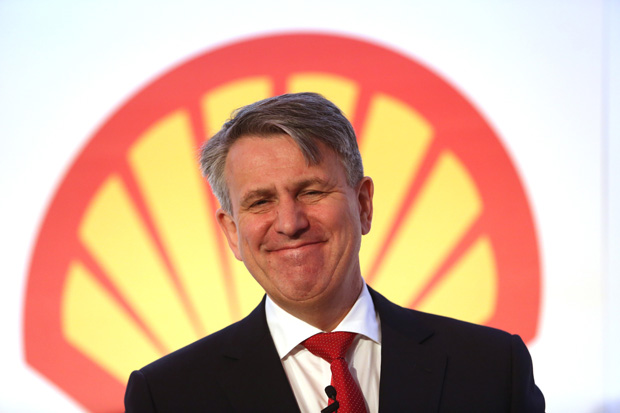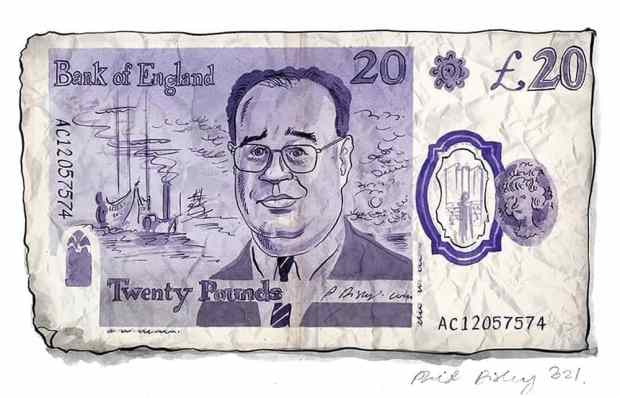Helge Lund was widely expected to go into domestic politics when he ended his successful tenure as head of Statoil, the Norwegian state oil and gas company. Instead, he was hired to run BG Group, the troubled former exploration arm of British Gas, but on a promise of such ludicrously rich terms — up to ten times his Statoil salary — that shareholders, the media and Vince Cable howled in protest. An embarrassed BG board had to scale back the offer, though it remained pretty fat and as I wrote at the time, ‘no mention of Lund, however good he turns out to be, will ever omit a jibe at his pay’.
He finally took over BG’s vacant helm a couple of months ago, but meanwhile the value of the company’s oil and gas assets had been written down, its capital expenditure had been slashed and its shares, once £15, were drifting down to £8.50. Then Royal Dutch Shell arrived with a bid in cash and shares worth £47 billion, representing a 50 per cent premium or £13.67 per share.
BG shareholders will think themselves lucky — and breathe a sigh of relief that their unhappy ship is now under the command of Shell boss Ben van Beurden, described by the FT as a ‘Mr Fix-it…with a laser-like focus on the bottom line’. Shell gains BG’s natural gas interests in Australia, a difficult but potentially lucrative offshore oil venture in Brazil, and operations in Kazakhstan and elsewhere — at a bundle price which experts say is well below what such projects might have cost to explore and develop.
The combined group comes a step closer to Exxon Mobil in the industry’s global league — leaving Chevron in third place with its eye on a possible bid for BP. The deal is the biggest in the sector since Exxon bought Mobil in 1998, and the biggest in any sector this year. The bankers involved — Bank of America for Shell, Goldman Sachs and micro-boutique Robey Warshaw (whose ex-Morgan Stanley principal, Simon Robey, doubles as chairman of the Royal Opera House) will share fees of $150 million between them. So adrenaline is pumping in and around Big Oil boardrooms, despite (or because of) a barrel price in the $50–$60 doldrums. And stock-market players have a choice of intriguing bets and arbitrage opportunities ahead.
As for Helge Lund, he said ruefully that he would rather have grown BG than sold it so quickly. Its problems were not his fault since he had just started, but there’s no suitable job for him in the new structure and he’ll probably head home to Norway next year.
It’s a moot point, however, that the news of his appointment last October failed to boost BG’s share price (which was above £10 at the time) and may well have depressed it during the winter row over his pay — so his passing through, for a payoff of £20 million, has arguably enabled Shell to pitch its bid lower than it might otherwise have done. Either way, if Lund is really set on becoming a politician next, he can afford an election campaign on a Hillary Clinton scale.
Single European chaos
Doncha just hate French air-traffic controllers? Their strike last Wednesday and Thursday (to be repeated this weekend and at the end of the month: beware) forced cancellation of half the flights into and out of French airports and caused long delays for anyone else trying to pass through French airspace — in my case, hours of tedium at charmless Palma airport before battling Ryanair got me home. The controllers’ principal beef is that their retirement age has been put back from 57 to 59, poor things, but they are also resisting changes in working practices and EU regulations.
Underlying all this is a decade-long row over the ‘Single European Sky’, a Brussels plan to bring air traffic across the continent under unified control rather than the 38 separate systems that currently operate — thereby saving some €5 billion of costs, theoretically improving air safety and cutting emissions, and creating efficiencies to cope with expected traffic growth, driven by low-cost airlines, of 50 per cent by 2030. Sounds smart, doesn’t it? But naturally this initiative is opposed by trade unions and hindered by national bureaucrats everywhere. And it will end up, like so much else about the European Union, in a botched compromise that suits special interest groups but does little or nothing for you and me.
In-flight voxpops
At least the proximity of Ryanair seats provided opportunities for pre-election voxpops, though it seemed hardly worth asking the outbound stag party from Bradford, lashing into a breakfast cocktail of vodka, Coke and Disaronno amaretto which they kindly shared with me, whether they had any voting intentions at all. I suspect they were in the same camp as the bleary-eyed forklift driver and his pink-haired girlfriend, rerouted overnight from Barcelona for their homeward journey, who said they knew nothing about any of the parties, didn’t watch the debates and probably wouldn’t bother going to the polling station.
More interesting was a disgruntled constituent of Ed Miliband in Doncaster North, a metal-bashing industrialist whose firm turns over £50 million-plus and employs more than 100 people at well above the minimum wage. Have Ed or his people ever visited or sent you a message? No. Ever done anything helpful at all? No. So what do you think of Labour generally?
‘Absolutely bloody useless. The only thing the local council ever did was try to close down our night shift, which would have cost 40 jobs. The Lep [that’s the Local Enterprise Partnership for “Sheffield City Region” — one of the bodies created by the coalition to replace Labour’s bloated regional development agencies] tries to be helpful but the Labour lot do the opposite. They’re supposed to be for the workers, but they’ve never done anything for my workers, I can tell you.’ I wonder how many managers of growth businesses around Britain, those small-to-medium-sized engines of prosperity, would say much the same thing?
Got something to add? Join the discussion and comment below.
Get 10 issues for just $10
Subscribe to The Spectator Australia today for the next 10 magazine issues, plus full online access, for just $10.
You might disagree with half of it, but you’ll enjoy reading all of it. Try your first month for free, then just $2 a week for the remainder of your first year.















Comments
Don't miss out
Join the conversation with other Spectator Australia readers. Subscribe to leave a comment.
SUBSCRIBEAlready a subscriber? Log in